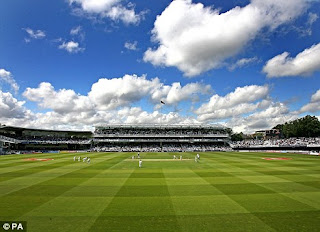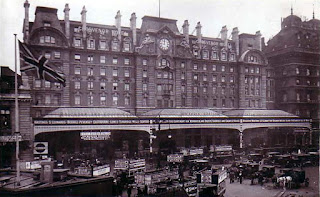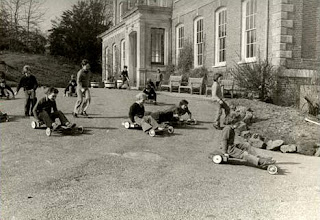
The final chapter of King Willow by George Mills is entitled "Eight Years Later," and it puts the finishing touches on the first two novels of Mills, including his very first, Meredith and Co.
The chapter begins: "It was late on a Wednesday afternoon, and the last day of the Oxford and Cambridge match at Lord's. The ground looked beautiful, the blue sky and green grass combining with the gay colours of the dresses in the crowded stands to make a wonderful splash of colour."
Oxford and Cambridge became the universities where the main schoolboy characters of Mills ended up.
After the match, the three main characters of King Willow—Pongo, Finch, and Falconer, better known as Hawk—end up in the car of Pongo, whom you may recall started as a timid and tearful young boy with a speech impediment at the beginning of Meredith and Co. They begin to discuss their former headmaster, "Peter" Stone, at fictional Leadham House School.
It is here we'll pick up Mill's narrative.
Shortly after the match, the three friends entered a large car that was waiting outside the pavilion. Pongo jumped into the driver's seat, while Finch and Hawk made themselves comfortable at the back. Pongo was on his way down to Sussex, to a small village where he now lived during vacation. He was going to drop the Hawk and Finch at their London hotels before going home…
There was a long traffic hold-up, and Pongo turned around.
 'What about coming down and seeing Peter on Saturday? You know he's retired, and living quite near us, in the same village. You'd better come down to lunch, and we'll drop in to tea with Peter. By the way, Hawk, you've got to come see Uggles.'
'What about coming down and seeing Peter on Saturday? You know he's retired, and living quite near us, in the same village. You'd better come down to lunch, and we'll drop in to tea with Peter. By the way, Hawk, you've got to come see Uggles.'
'Uggles!' cried Finch. 'Is he still alive?'
'Yes,' answered Pongo, 'but he's very shaky on his pins, poor old chap! He'll go nearly mad when he sees the Hawk! There's quite a good train at 10.45 from Victoria. I'll meet you at the other end.'
As Pongo drove off from the traffic block, his mind went back some ten years, and he saw himself once again as a trembling new boy on his mother's arm, as he had waited for the train on the platform of Victoria Station. He addressed his two friends once more.
'I've not seen much of Peter yet, but I'll tell him we're coming. He'll probably give us tea in the garden. He's got a nice little place, and the last time I saw him he was very well.'
By this time the Hawk and Finch had reached their destinations, and Pongo dropped them off with a wave of his hand and a cheery 'Well, don't forget. The 10.45 from Victoria. I'll meet you.'
Longtime readers of this site will recall a message once received from Dr. Tom Houston of Windlesham House School, where George Mills had his first teaching job in 1925-1926. Let's review some of what Dr. Houston revealed about George.
G.R.A. Mills, BA Oxon, taught 4 terms at Windlesham House School [left] from Lent 1925 until Easter 1926, and maybe part or all of the summer, but his name was taken off the staff list by end of summer term 1926…
 In 1925 Windlesham was at “Southern Cross”, Portslade, near Brighton; principal Mr Charles Scott Malden; headmaster Mr H D L Paterson; and the dog, Tubby.
In 1925 Windlesham was at “Southern Cross”, Portslade, near Brighton; principal Mr Charles Scott Malden; headmaster Mr H D L Paterson; and the dog, Tubby.
In April George Mills married Miss Vera Beauclerc [sic]; they bought a house on Benfield Way, Portslade…
We have no record relating to his sudden (?) departure. He could, like a handful of other prep school masters, have been excited by the General Strike (that term)…
During summer 1935 he visited Mrs Charles [Malden], then in Springwells, Steyning, W. Sussex, and told her he had written a book “largely about Windlesham”, published by O.U.P. “He had been at 2 or 3 schools since, but is very faithful to Windlesham”, she said…
Uggles may have been related to Tubby, the Malden’s popular and heroic dog. The portrait of the headmaster Peter Stone has something of Christopher Malden, who had been in effect joint head for some years; he became principal in 1927. Mills evidently had a gift for befriending boys and learning their secrets; Meredith & Co. captures the idiom of pupils during the interwar period more accurately than any other novel.
There is certainly a wealth of information in those few paragraphs.
The excerpt from King Willow above notes that Pongo had a vacation home in a small village in Sussex. Mills, during the late 1920s and early 1930s was a rather itinerant teacher who had taught not only in Sussex, but in Windermere, London, and Glion, Switzerland, during the time. This home of Pongo's, used during vacations from school, could clearly have been based on Mills's own home in Portslade.
Despite Mills having left Sussex to continue to teach, he seems always to have kept ties there, which explains the repetitive nature of locations in Sussex continually cropping up in the later life of George Mills.
1935, incidentally, was the year during which Windlesham "moved to 60 acres in the Sussex downs north of Worthing," according to a more recent correspondence from Dr. Houston. That event may have occasioned some nostalgia on the part of Mills.
 By the way, Charles Scott Malden, mentioned above, had died in 1896, the year of Mills's birth, and could not have been at Windlesham during George's tenure there, although the elder Malden still may have been a legend around campus.
By the way, Charles Scott Malden, mentioned above, had died in 1896, the year of Mills's birth, and could not have been at Windlesham during George's tenure there, although the elder Malden still may have been a legend around campus.
However, it is the actual visit to Springwells, Steyning [right], that is of greater interest here. While what follows is not in any way a non-fiction account of that visit, the occasion must have meant a great deal to George Mills.
It was Saturday afternoon at about four o'clock, and three young men might have been seen walking slowly through the street of a beautiful little village in Sussex. They were arm-in-arm and talking excitedly.
'You know,' one of them was saying, 'Peter doesn't look much older. A bit grayer, that's all.'
The three young men went on talking until they reached a short drive entered by a wide gate that had been fixed against a post. They turned in through the gate and walked up the drive. Sitting outside the house, on a balcony, was Peter, with Mrs Stone. The tea things were laid, and Peter was on the look-out. When he saw his visitors he rose and hastened down the drive to meet them. He shook each hand cordially, his eyes sparkling with joy.
'Well, Falconer and Finch, this is a pleasure. Ogilvie [Pongo] told me you were coming down, and we were expecting you.'
The Hawk kept on looking at Peter. The grand old man had changed but slightly. He was as erect as ever, but perhaps somewhat more portly. He led the way up to the house, where Mrs Stone gave them all a very warm welcome.
Peter certainly had found a beautiful home. The house, an old farmstead, stood in a small but perfect garden. A little lawn stretched away from it, and a kitchen garden was at the back. Rose trees dotted about and well-kept flower-beds made the scene from the little balcony one of great beauty. Peter indicated some comfortable wicker chairs and Mrs Stone began to pour out the tea.
When the young men had settled themselves down, Peter talked about the match.
'I wish I had been there. That must have been a hot catch of yours, Falconer. The papers were full of it.'
'Oh, yes, sir,' laughed the Hawk. 'I told Finch that it was a bit of a fluke. He hit it straight at me, sir.'
During the serious business of tea there was little conversation. Peter kept glancing at the three boys, now grown to men, and he was very proud of them. Soon after tea Mrs Stone excused herself and left the men together. They produced their pipes and settled down to talking. They had eight years to bridge—eight years of ups and downs, of successes and failures at their public schools. Peter listened intently, allowing them to talk on.
After a while the conversation turned to the future and the careers they intended to adopt. The boys asked Peter's advice on all manner of subjects, and he did his best to answer them. Gradually, however, the as was only natural, the talk reverted to Leadham House, but this time Peter did not listen. As he sat back in his chair, blowing clouds of tobacco from his pipe, he was gazing into the future. He saw the three boys, now on the threshold of manhood, all making names for themselves and doing credit to their professions.
He knew their characters and feared nothing. He saw Finch destined for the Bar, a just and fearless judge, honoured by all men. Ogilvie, who was going into the army after his university career, Peter saw as a great soldier and administrator. But when he thought of Hawk, Peter smiled to himself. Falconer had been his favorite pupil, but Peter would not have admitted it to anybody. He knew that the hawk was to reach great heights, and he saw him as a priest in one of the poorest London parishes, cheerful and smiling, with a horde of ragged children clinging joyfully to the skirts of his cassock. He saw him in the midst of squalor and poverty going on his splendid way of radiating love and happiness. As he sat on the balcony that afternoon, entirely unconscious of the conversation going on around him, Peter's mind sped back through the years, and saw the Hawk, once more the grubby, laughing schoolboy devoted to sport and animals…
 In this paragraph, filled with Peter's fictional reveries, we find some hidden real-life tributes.
In this paragraph, filled with Peter's fictional reveries, we find some hidden real-life tributes.
First, Finch had earlier in the chapter been the batsman for Cambridge referred to by Falconer.
Finch is destined for the Bar out of Cambridge—much like the well-rounded mentor of George Mills at Warren Hill School in Eastbourne, Joshua Goodland [left]. While Goodland would never become a judge—Joshua would, in fact, pass away the next year while serving as vicar of the parish of Compton Dundon—it's probable that Goodland had shared with George the thought that if he'd stayed in his law career he might have at some point. After all, becoming a judge would have been the next logical step in his legal career. That step, however, was never taken: Goodland instead bought into Warren Hill School and eventually became owner and Headmaster. Perhaps it had been with regret that Goodland spoke of it with George.
And if this fictional visit to a village in Sussex reflects Mills's own visit there in 1935, it's interesting to note that 1935 was also the year in which Fr Basil Jellicoe, the noteworthy and charismatic reformer from the parish of St Pancras, had passed way from pneumonia at just 37 years of age—but most attributed his death to overwork on behalf of the London's poor children.
We've surmised there must have been a relationship between Jellicoe and Mills before, one that would have stemmed from George attending Oxford, where Jellicoe had run the Magdalen College Mission, which was manned by volunteer students from the university.
 Once again, this indicates at the very least some admiration for Jellicoe [right] on the part of Mills, and even suggests that—given the intimacy that fictional Peter Stone exhibits in his knowledge Falconer above, as the latter graduates from Oxford—that the Mills and Jellicoe had been close friends.
Once again, this indicates at the very least some admiration for Jellicoe [right] on the part of Mills, and even suggests that—given the intimacy that fictional Peter Stone exhibits in his knowledge Falconer above, as the latter graduates from Oxford—that the Mills and Jellicoe had been close friends.
Lastly, Peter envisions Pongo as an army officer who would make a "great soldier and administrator." Pongo as a timid young boy with a speech impediment (a lisp), as we know, was based on Mills himself.
So here we have a great clue: Pongo's character soon would be off to the army as an officer after of Oxford.
Mills, along with most others, must have seen war brewing in Europe. Soon after the publication of King Willow in 1938, George would be named an officer in the Royal Army Pay Corps out of the officer's reserve in 1940—interestingly, something Jellicoe had done following university, when he entered the navy as an officer during the First World War.
 Spending WWII as a war substitute officer [left] certainly must have appealed to Mills. With the advent of hostilities in China and Europe signaling renewed global violence, a return to the military, this time as a officer, must have been on his mind.
Spending WWII as a war substitute officer [left] certainly must have appealed to Mills. With the advent of hostilities in China and Europe signaling renewed global violence, a return to the military, this time as a officer, must have been on his mind.
So, here we have some evidence that Mills was already beginning to think that he might not spend the rest of his life writing books, especially as we can see that he was sending his most popular literary characters out into the world as adults.
George had been a failure in the Army Pay Corps during WWI, and in choosing Pongo for duty as an administrator in the army, he was—perhaps unknowingly—charting the same course for himself.
As we close things out at Who Is George Mills?, it seems natural that the examination of this chapter would fall close to the end of our work here. With that in mind, I'd like to finish it out to its end, as Peter sits among his billowing smoke, contemplating the future of the boys:
Then for no apparent reason he raised his eyes, and looked down the drive. What he saw made him sit up and smile.
'Ogilvie,' he asked suddenly, 'why didn't you bring Uggles to-day? I have not seen him for some time, and I was expecting him.'
Pongo laughed.
'Well, sir, he's rather weak on his legs these days, and he was so pleased at seeing the Hawk again that I thought it might be too much for him.'
Peter smiled expansively.
'He seems to have settled that point for himself. Here he comes!'
The three young men looked down the drive and rose to their feet. Uggles was labouriously coming towards them, puffing with his exertions, and Ogilvie laughingly called over to him.
'Come along, old chap, stir those stumps of yours!'
But the old bulldog found the pace altogether too hot for him. He was in extreme old age, but radiantly happy. Every few yards he lifted his head and looked up at his lord and master with devotion streaming from his eyes now growing dimmer. He ambled along slowly towards the spot where his friends were awaiting him, and snuffled as he went.
 With that ending, King Willow closes with a paean both to the past and George's love of dogs, but with eyes focused clearly on the future.
With that ending, King Willow closes with a paean both to the past and George's love of dogs, but with eyes focused clearly on the future.
George Mills was 42 years old when the book was published and surrounded by notes for his next two texts (which would both be published in 1939), but he was, himself, looking forward as well. Mills, who had known many more failures in his life than successes to that point, would begin to turn things around and make right many of the perceived wrongs he'd endured in his past.
This last scene, with a contemplative Peter wreathed in smoke and the worthy and loyal Uggles snuffling back to his friends, is the sort of sentimental tableau that Mills must have envisioned for himself at the end of his own life.
But before that could be, Mills had some unfinished business. First, his failed relationship with the military would need to be mended, leaving him with a point of pride there instead of a closeted shame.
We'll take a look at the ways in which Mills began to work steadily to vindicate what he perceived to be his failures next time.


![Meredith and Co. [1933] by George Mills](https://blogger.googleusercontent.com/img/b/R29vZ2xl/AVvXsEjlUeRNPnH8Xd8JT59QdtabQHRI6DI6Hqew57i6qixjOL3LjgUD9g22o3-wNlmBya36D5-6KZXX-sxLnktAfEqjlvTmdwyiIL2K6VHOGW2Wq9Pe8_oFGknENfVE1Xrkdj0b8FYXTz_6SMg/s1600-r/sm_meredith_1933.JPG)
![King Willow [1938] by George Mills](https://blogger.googleusercontent.com/img/b/R29vZ2xl/AVvXsEgiz_iaQjinIbVw6yQ-W4hwx6wGJwMQH9azCs3Qacp9eX627B7Eq9hMn1wlHLzlkbcflHRWM8VcPX-1uteKbs4LA5q5Oq69WhrnhzBQLjpseK_M34PSoOOhTZ96EfVAGFehG53gZ0M4EvU/s1600-r/sm_1938.JPG)
![Minor and Major [1939] by George Mills](https://blogger.googleusercontent.com/img/b/R29vZ2xl/AVvXsEgH5nj4Q6BNpzVEb1vyJeGV6ikuN4SFAyDa-jypIgbvdrxqcjHkNxqjrXH7ptZmge7oTTpn5QjAI0yCJPdI-fIzooCDD1TAA3RDxO9jzLcU3QOIhBWKiKNz6CPjCSTZgIPd9_4zM7LLpAw/s1600-r/sm_1939.JPG)
![Meredith and Co. [1950] by George Mills](https://blogger.googleusercontent.com/img/b/R29vZ2xl/AVvXsEgm_JPAXPpX0wb8bDkjYG67Sg1HePiPhRP6b9oUMWvkJhiW6XJzmxTQ7TBepfxpPgRrFNCRuumYRj-SAfU9Kw-uDsbO5HBtyxfQfClHVMJxJUkDpbkrCPhzpC4H_g_ctlirgnSla4vX1EQ/s1600-r/sm_1950.JPG)
![Meredith and Co. [1957?] by George Mills](https://blogger.googleusercontent.com/img/b/R29vZ2xl/AVvXsEg0zRm3-CCmA8r2RrBmrACDvmxJjoBjfxUoPI9yc6NWu1BZ3dd89ZvCixmmKZe1ma0QiDIrsDZNqf-8h1egh0JLiRYHagXAqQ1UknWPy6SksK76psYPcEMLGa_Aj7wo2vMFPo0aMdcx_pg/s1600-r/sm_meredith.JPG)













No comments:
Post a Comment